Help us continue our efforts to go ad-free!
LiederNet ran no external ads last month but donations only matched part of our usual ad revenue .
All of our work is done by human beings for human beings, and we have expenses to pay. Please help us continue to share this one-of-a-kind resource with the world.

Songs of Travel
Song cycle by ralph vaughan williams (1872 - 1958), translated to:.
Catalan (Català) — Cançons de viatge (Salvador Pila) Lithuanian (Lietuvių kalba) — Kelionės dainos (Giedrius Prunskus)
1. The vagabond [sung text checked 1 time]
Authorship:
- by Robert Louis Stevenson (1850 - 1894), "The vagabond", subtitle: "To an air of Schubert", appears in Songs of Travel and other verses , no. 1, first published 1896
See other settings of this text.
Available translations, adaptations or excerpts, and transliterations (if applicable):
- CAT Catalan (Català) (Salvador Pila) , copyright © 2016, (re)printed on this website with kind permission
- ITA Italian (Italiano) (Ferdinando Albeggiani) , "Il vagabondo", copyright © 2005, (re)printed on this website with kind permission
- LIT Lithuanian (Lietuvių kalba) (Giedrius Prunskus) , copyright © 2023, (re)printed on this website with kind permission
Confirmed with The Complete Poetry of Robert Louis Stevenson: A Child's Garden of Verses , e-artnow, 2015 (via Google Books).
2. Let Beauty awake [sung text checked 1 time]
- by Robert Louis Stevenson (1850 - 1894), no title, appears in Songs of Travel and other verses , no. 9
Go to the single-text view
- CAT Catalan (Català) (Salvador Pila) , "Que desperti la Bellesa", copyright © 2016, (re)printed on this website with kind permission
- GER German (Deutsch) [singable] (David Paley) , "Die Schönheit erwacht!", copyright © 2011, (re)printed on this website with kind permission
- ITA Italian (Italiano) (Ferdinando Albeggiani) , "Che si desti Bellezza", copyright © 2008, (re)printed on this website with kind permission
- LIT Lithuanian (Lietuvių kalba) (Giedrius Prunskus) , "Lai grožis pabus", copyright © 2023, (re)printed on this website with kind permission
3. The roadside fire [sung text checked 1 time]
- by Robert Louis Stevenson (1850 - 1894), no title, appears in Songs of Travel and other verses , no. 11, first published 1896
- GER German (Deutsch) [singable] (David Paley) , "Romanze", copyright © 2010, (re)printed on this website with kind permission
- ITA Italian (Italiano) (Lucio Forte) , "Farò spille e balocchi per tua delizia", copyright © 2008, (re)printed on this website with kind permission
4. Youth and love [sung text checked 1 time]
- by Robert Louis Stevenson (1850 - 1894), "Youth and Love II", appears in Songs of Travel and other verses , no. 3
- GER German (Deutsch) (Sebastian Viebahn) , "Der Junge und die Liebe", copyright © 2004, (re)printed on this website with kind permission
- ITA Italian (Italiano) (Lucio Forte) , "Gioventù e amore", copyright © 2008, (re)printed on this website with kind permission
5. In dreams [sung text checked 1 time]
- by Robert Louis Stevenson (1850 - 1894), no title, appears in Songs of Travel and other verses , no. 4, first published 1896
- GER German (Deutsch) [singable] (David Paley) , "Im Traum", copyright © 2011, (re)printed on this website with kind permission
- ITA Italian (Italiano) (Ferdinando Albeggiani) , "Nei sogni", copyright © 2008, (re)printed on this website with kind permission
6. The infinite shining heavens [sung text checked 1 time]
- by Robert Louis Stevenson (1850 - 1894), no title, appears in Songs of Travel and other verses , no. 6
- CAT Catalan (Català) (Salvador Pila) , "Els cels infinits i resplendents", copyright © 2016, (re)printed on this website with kind permission
- ITA Italian (Italiano) (Ferdinando Albeggiani) , "I cieli splendenti e infiniti", copyright © 2008, (re)printed on this website with kind permission
- LIT Lithuanian (Lietuvių kalba) (Giedrius Prunskus) , "Spindįs begalinis dangus", copyright © 2023, (re)printed on this website with kind permission
7. Whither must I wander? [sung text checked 1 time]
- by Robert Louis Stevenson (1850 - 1894), no title, appears in Songs of Travel and other verses , no. 16, to the tune of Wandering Willie, first published 1896
- CAT Catalan (Català) (Salvador Pila) , "On haig d’anar?", copyright © 2016, (re)printed on this website with kind permission
- GER German (Deutsch) [singable] (David Paley) , "Wohin muss ich wandern?", copyright © 2010, (re)printed on this website with kind permission
- ITA Italian (Italiano) (Ferdinando Albeggiani) , "Dove mi tocca andare?", copyright © 2008, (re)printed on this website with kind permission
- LIT Lithuanian (Lietuvių kalba) (Giedrius Prunskus) , "Kur turiu keliauti?", copyright © 2023, (re)printed on this website with kind permission
8. Bright is the ring of words [sung text checked 1 time]
- by Robert Louis Stevenson (1850 - 1894), no title, appears in Songs of Travel and other verses , no. 14, first published 1896
- CAT Catalan (Català) (Salvador Pila) , "Lluminós és el ressò de les paraules ", copyright © 2016, (re)printed on this website with kind permission
- HUN Hungarian (Magyar) (Péter Molnár) , "Élénk a szavak zengése", copyright © 2004, (re)printed on this website with kind permission
- ITA Italian (Italiano) (Ferdinando Albeggiani) , "Luminoso è il suono delle parole", copyright © 2008, (re)printed on this website with kind permission
9. I have trod the upward and the downward slope [sung text checked 1 time]
- by Robert Louis Stevenson (1850 - 1894), no title, appears in Songs of Travel and other verses , no. 22
- CAT Catalan (Català) (Salvador Pila) , "He petjat per pendents amunt i avall", copyright © 2016, (re)printed on this website with kind permission
- ITA Italian (Italiano) (Ferdinando Albeggiani) , "A piedi ho percorso salite e discese", copyright © 2008, (re)printed on this website with kind permission
- LIT Lithuanian (Lietuvių kalba) (Giedrius Prunskus) , "Kopiau į kalnus aš ir leidausi žemyn", copyright © 2023, (re)printed on this website with kind permission
We use cookies for internal analytics and to earn much-needed advertising revenue. (Did you know you can help support us by turning off ad-blockers?) To learn more, see our Privacy Policy . To learn how to opt out of cookies, please visit this site .
I acknowledge the use of cookies
Songs of Travel (1904)
By ralph vaughan williams, songs in this series.

Ralph Vaughan Williams
Ralph Vaughan Williams was an English composer. Over sixty years, he composed operas, ballets, chamber music, vocal pieces and orchestral compositions. He was strongly influenced by Tudor music and English folk-song. Information from Wikipedia.…
Performances
Previously performed at:.
- LiedFest Berlin-Oxford 25 Nov 2022
- 26. Ashley Riches, Anna Tilbrook: Vaughan Williams: Perspectives 2 19 Oct 2022
- 104. Christopher Maltman: Songs of Travel 23 Oct 2021
- 08. Songs of Travel: James Platt & Lada Valešová 28 Feb 2021
- Songs of Travel: Benjamin Appl & Simon Lepper 02 Apr 2020
- Songs of Travel: Nicholas Mogg & Jâms Coleman 19 Oct 2018
- James Gilchrist & Anna Tilbrook 03 Mar 2017
Help us with a Donation
Enjoying our texts and translations? Help us continue to offer this service to all.
Make a Donation
Select Tickets

IT IS WITH GREAT SADNESS THAT WE ANNOUNCE THE PASSING OF OUR PRESIDENT SIR ANDREW DAVIS CBE. R.I.P.
The First Songs of Travel
The 1954 richard standen / frederick stone recital, this pioneering 1954 westminster lp recital by richard standen (bass-baritone), accompanied by frederick stone (piano), has been remastered for albion records by ronald grames in excellent sound and issued on albcd055. .
This was the first recording of the (then) entire Songs of Travel and includes premiere recordings of five of the songs. We now know the full cycle of nine songs, but only eight of them were published in the composer’s lifetime. The ninth song was not found until after the composer’s death, some four years after this recording was made. Standen’s performance of Songs of Travel was highly regarded by Vaughan Williams.
Richard Standen lived from 1912 to 1987. He appeared on many recital and concert broadcasts on the BBC and soloed in the Bach passions under Vaughan Williams’s baton. He was a popular soloist in choral festivals throughout Great Britain and the European continent during 25 years of active performing, as well as a popular song recitalist. For 20 years he was a well-regarded professor of voice at the Guildhall School of Music and Drama, beginning in 1963.
Frederick Stone is only known today as Kathleen Ferrier’s accompanist on a frequently reissued recital disc, but he had a remarkable 30-year career as a staff accompanist for the BBC and appeared in hundreds of broadcasts with many of the great and near-great performers of his time. This release pays homage to an artist who, sadly now almost forgotten, should be much better known.
Other works by Vaughan Williams in this recital are Silent Noon , The Water Mill – which we know Standen studied with Vaughan Williams – and Linden Lea . Other composers represented (all in the Sea Ballads second half of the recital) are:
Frederick Keel (1871-1954) Michael Head (1900-1976) Charles Villiers Stanford (1852-1924) John Ireland (1879-1962) Albert Mallinson (1870-1946) Malcolm Davidson (1891-1949) Peter Warlock (1894-1930).
In addition to Vaughan Williams, Head and Ireland were still living at the time the recording was made, and the recital included premiere recordings of Keel’s Three Salt-Water Ballads as a cycle, and of Davidson’s A Christmas Carol .

Richard Standen
CRITICAL REVIEWS
Standen and Stone offer direct and unmannered performances that are neat and nimble… As a fine example of recital singing during the 1950’s this is impressive and insightful. Allied to the excellence of the audio restoration and the attractiveness of Albion’s presentation this makes for a wholly enjoyable hour’s music-making regardless of age. For full review click:
Nick Barnard Musicweb International
The accompanying booklet gives the words of the songs, but with Standen, they are never needed. The first section has some of the best of Songs of Travel – The Vagabond, dauntless and sturdy, Bright is the Ring of Words , a joyous celebration of the transformative power of Art, while The Roadside Fire is sunny and exuberant. Standen delivers the melancholy spirit of Whither Must I Wander so movingly. The other Vaughan Williams songs include a delicious performance of Silent Noon , the splendidly graphic narrative of The Water Mill and of course Linden Lea . …
I was truly impressed by the three sea songs by J. Frederick Keel, especially Mother Carey, a mythical threat to all ships. Albert Mallinson’s Four by the Clock and A Christmas Carol by Malcolm Davidson, darker with rich piano accompaniments, were new to me, but really worth hearing.
For full review click:
Alan Cooper British Music Society
…hugely enjoyable, well recorded and has been played more often than reviewing duty required. Warmly recommended.
David Morri s Elgar Society
An absolute must for VW fans as the spirit of the age lives on.
Andrew Palmer Yorkshire Times
(nb. You do not need a Paypal account to purchase)
Postage is fixed at £3 per order – to anywhere in the world – irrespective of the number of CDs in the order.
Contact Information
To contact Officers of the Ralph Vaughan Williams Society please click on the links.
Chairman & Treasurer
Vice Chairman & Secretary
Vice Chairman
Membership Officer
To publicise your concert click here
Publicity & Events Officer (To publicise events, recordings, publications)
Journal Editor (To send us articles)
Information Officer (All matters relating to RVW)
Albion Records (The RVW Society recording label)
© THE RALPH VAUGHAN WILLIAMS SOCIETY | ACKNOWLEDGEMENTS AND COPYRIGHT | LEGAL | PRIVACY
Ralph Vaughan Williams ‘The Vagabond’: A Song of Travel
Published by alex burns on 13th september 2020 13th september 2020, ralph vaughan williams: the vagabond.
Ralph Vaughan Williams’ The Vagabond was originally set for voice and piano and is part of a larger song cycle entitled Songs of Travel. Composed between 1901-1904, this was Vaughan Williams’ first major offering in the world of vocal music. Songs of Travel is a nine part song cycle, with text drawn from the poems of Robert Louis Stevenson’s collection. The song cycle is quintessentially British, and gives a fresh perspective on the Wayfarer Cycle style (E.g Gustav Mahler’s Lieder eines fahrenden Gesellen or Franz Schubert’s Winterreise ).
Although originally written for voice and piano, the Songs of Travel cycle has also been orchestrated for orchestra and voice. Vaughan Williams orchestrated the first, third and eighth songs, and his assistant Roy Douglas orchestrated the remaining songs in the cycle. Although the orchestral versions are still performed in concert halls, the intimacy and raw emotion from the original chamber version is often preferred.
The Vagabond is the first song in the cycle and sets the scene for the traveller. The style that starts off this song cycle is an homage Vaughan Williams’ love of Romanticism that came before. A vagabond is often used to describe someone who travels a lot without a home or job, which sets the scene for this song. The text is taken from Robert Louis Stevenson’s poem of the same name and can be found here:
Give to me the life I love,
Let the lave go by me,
Give the jolly heaven above,
And the byway nigh me.
Bed in the bush with stars to see,
Bread I dip in the river –
There’s the life for a man like me,
There’s the life for ever.
Let the blow fall soon or late,
Let what will be o’er me;
Give the face of earth around,
And the road before me.
Wealth I seek not, hope nor love,
Nor a friend to know me;
All I seek, the heaven above,
And the road below me.
Or let autumn fall on me
Where afield I linger,
Silencing the bird on tree,
Biting the blue finger.
White as meal the frosty field –
Warm the fireside haven –
Not to autumn will I yield,
Not to winter even!
Wealth I ask not, hope nor love,
All I ask, the heaven above,
The heavy opening marching chords highlight the steady and purposeful tread of the traveller as they make their way down the open road. The ascending triplet figure gives some glimmer of hope as the vagabond makes their way through what can only be assumed to be the British countryside. This opening instrumental prelude foreshadows the vocal line a few bars later. The dotted rhythms above the strict march chords below shows the dichotomy between the traveller’s head and his feet. The vocal line is light in style, even with it being originally sung by a baritone voice, and the dainty movement in the ascending phrases is light relief from the heaviness below.
The accompaniment sees the left hand act as the steady bass, changing between tonic and dominant chords for a large proportion of this song. Whereas the right hand moves in unison with the voice, offering harmonic colour to the structure of the song.
Vaughan Williams utilises the words of Stevenson’s poem to accentuate certain rhythms and pitches to create a really picturesque work. Just in the first stanza the line ‘Give the jolly heaven above’ is full of very subtle musical accentuation. Firstly, the bouncy dotted rhythms represent the idea of jolliness perfectly. Secondly, the ascending figure is a great example of word painting, like the traveller is heading to heaven one day, or he is remembering those passed on. These subtle links between the music and the text make The Vagabond a very successful example of nuanced word painting and scene setting.
Furthermore, the line ‘There’s a life for a man like me’ is also an important anchor within this song. This line is proclaimed loud and proud, showing the attitudes of the traveller. He is proud to be a vagabond, and ends this stanza with ‘There is a life forever’ which shows his acceptance of his lifestyle to last forever. The strength heard through the voice on these two lines is replicated throughout the songs on other important ‘story’ lines.
During the third stanza is where the atmosphere begins to change, largely due to a stark change in the accompanying music. The text for this stanza is as follows:
One could assume that the change in atmosphere here is to do with the changing of the season, from summer to autumn, which can bring more tumultuous weather. Vaughan Williams uses more word painting in this section to create different emotions. The second line ‘Where afield I linger’ is important in this section, as the vocalist literally lingers on the word ‘linger’ to create some sort of tension that is threaded through this whole section.
The atmosphere changes again on the line ‘White as the meal the frosty field’, with the colour white representing something pure and perhaps even childlike. The accompaniment plays a delicate flourish of arpeggiated chords, whilst the voice takes the dynamic down and is much more delicate in its approach. The next line starts on the word ‘warm’ and the music reflects this by dropping down an octave in the accompaniment and rumbling up again, like starting a real fire. This whole section builds to a dazzling climax, which is then quickly eradicated in the next section.
The final stanza is a direct repeat of the second stanza of text, however the atmosphere has again been changed. Dissolved to a mere whisper, this final section starts very quietly. The original structure is back with the steady chords from the accompaniment and the dotted triplet movement from the melody and the vocalist. The idea that the traveller is not asking for wealth, hope, love or friends, but instead he just wants to continue with the idea of heaven and the road below him. The penultimate line ‘All I ask, the heaven above’ is proclaimed, like he is actually talking to a higher power above. Then the final line ‘And the road below me’ is back down to a gentle and quiet statement, as he is no doubt closer to the road then the sky and above.
The accompaniment repeats the chords once more, but this time placing them in a manner that is not as steady as before, which perhaps represents the traveller beginning to stop his journey. The Vagabond bears many different readings, from spiritual, to romantic, but it really is up to the listener to figure that out. For me, this work is quintessential in the development of the British song cycle as it lays the foundations for works to come. The rest of the song cycle is all about this traveller and the trials and tribulations of travelling.
Final Thoughts
A lot can be said for the nuanced style of word painting that really gets into the core of what the text is aiming to present to an audience. Vaughan Williams is one of the masters of this, and many of his vocal works are absolutely full of these subtle, but very important musical messages. May his legacy strongly live on.
Ⓒ Alex Burns
Happy Reading!
Image Source
You might also enjoy… Peter Warlock: Sleep
Recommended Recordings:
Axel · 20th January 2023 at 12:05 am
thanks a lot, this helped me really understand this song a wholleee lot better.
Leave a Reply Cancel reply

Your email address will not be published. Required fields are marked *
Related Posts

Joseph Haydn ‘Symphony No.20’: Festive Fun!
Joseph Haydn: Symphony No.20 Context Often known as the ‘Father of the Symphony’, Joseph Haydn’s legacy as a symphonist stays strong today. Haydn composed 104 symphonies over the course of his long and fruitful life, Read more…

Gustav Mahler ‘Symphony No.2’: Movement V
Gustav Mahler: Symphony No.2 (Movement V) Movement V At Mahler’s funeral on 22nd May 1911, fellow composer and friend J.B. Fӧrster recalled that, although Mahler had requested no music to be played at the Read more…
Gustav Mahler ‘Symphony No.2’: Movement IV
Gustav Mahler: Symphony No.2 (Movement IV) Movement IV Although added very late in the compositional process, the fourth movement plays a key role in the dramaturgy of the symphony. After the riotous Scherzo, this movement Read more…

Songs of Travel

Ralph Vaughan Williams (arr. Donald Patterson )
General Info
Year: 1901-4 / Duration: Difficulty: (see Ratings for explanation) Publisher: U.S. Marine Band Cost: Score and Parts - Unknown
1. The Vagabond - 3:00 2. Let Beauty Awake 3. The Roadside Fire 4. Whither Must I Wander - 3:25 5. I Have Trod the Upward and the Downward Slope
Instrumentation
(Needed - please join the WRP if you can help.)
None discovered thus far.
Program Notes
Songs of Travel was among British composer Ralph Vaughan Williams’ first forays into writing songs, and it coincided with a very important time in his compositional career. The songs were composed between 1901 and 1904 when the young Vaughan Williams was beginning to emerge as a unique voice among the luminaries of English classical music. It was the same year he completed this song cycle, in 1904, that he also discovered his passion for the traditional English folk songs that would become a central character in the next fifty years of his compositional life. Although Songs of Travel immediately predates this period, this music is filled with folk-like character. The pairing of Vaughan Williams’ lush and evocative music with the colorful prose of Robert Louis Stevenson brings to life these stories of a weary wanderer in search of something meaningful.
The nine songs in the cycle were originally conceived by Vaughan Williams as a set, but the first eight were released and published separately in two volumes in 1903 and 1905. These first eight songs were performed together in 1904; the final song in the modern edition of the cycle, I Have Trod the Upward and the Downward Slope was clearly composed as an epilogue to the entire narrative of the collection, but was not formally published and performed until 1960, when Vaughan Williams’ widow discovered it among his papers after the composer’s death. All of the songs were originally composed for baritone voice and piano, but Vaughan Williams orchestrated the first, third, and eighth songs almost immediately after their composition. His assistant, Roy Douglas, orchestrated the remaining songs with the same instrumentation several years after Vaughan Williams’ passing.
Marine Band music production chief Master Sergeant Donald Patterson has crafted a transcription of five of the Songs of Travel specifically for the Marine Band. The Vagabond introduces the traveler, with heavy tramping chords depicting a rough journey on the open road and through the English countryside. The vocal line in Let Beauty Awake evokes the images of dawn and dusk with a long and languid melody that floats over soft arpeggios in the accompaniment. The tone shifts in The Roadside Fire, as the traveler delights in envisioning a life and home with a new-found love. Whither Must I Wander is the earliest song composed of the set and shares its character with Vaughan Williams’ most famous song, Linden Lea, which was composed the year before. It is a bittersweet reminiscence of warm memories of home and family, now lost to the traveler’s past and never to return. The epilogue, I Have Trod the Upward and the Downward Slope recounts fragments of several musical themes from the other songs in the cycle as the weary traveler remembers his experiences one final time before he “closes the door.”
- Program Note from U.S. Marine Band concert program, 22 March 2015
State Ratings
Performances.
To submit a performance please join The Wind Repertory Project
- United States Marine Band (Washington, D.C.) (Jason K. Fettig, conductor; Kevin Bennear, baritone)) - 26 August 2021
- United States Marine Band (Washington, D.C.) (Ryan J. Nowlin, conductor; Kevin Bennear, baritone) - 10 March 2017 (82nd Annual ABA National Convention)
Works for Winds by This Composer
Adaptable Music
- Folk Songs from Somerset (Flex instrumentation) (arr. Huckeby) (1924/2020)
- My Bonny Boy (Flex instrumentation) (arr. Huckeby) (1924/2020)
- Seventeen Come Sunday (Flex instrumentation) (arr. Huckeby) (1924/2020)
All Wind Works
- Concerto for Bass Tuba (arr. Wick and Chambers) (1954/1992)
- Concerto Grosso (arr. Grechesky) (1924)
- Concerto in F minor for Tuba and Winds (arr. Hare) (1954/1992)
- England's Pleasant Land (arr. Noble) (1938/2017)
- English Folk Song Suite. See: Folk Song Suite
- English Folk Song Suite (arr. Villanueva) (1924/)
- Fantasia on a Theme by Thomas Tallis (arr. Bocook) (1910/2006)
- Fantasia on Christmas Carols (arr. Laughlin) (1912/2016/2020)
- Fantasia on Christmas Carols (arr. Winkelman) (1912/2013)
- Fantasia on Greensleeves (arr. Wagner) (1934/2011)
- Five English Folk Songs (arr. Feldman) (1913/2009)
- Five Variants of "Dives and Lazarus" (arr. Gregson) (1939/2004)
- Flourish for Glorious John (orch. Boyd) (1957/1998)
- Flourish for Wind Band (1939)
- Folk Song Suite (1924/2008)
- The Golden Vanity (arr. Wagner) (1933/2009)
- I Vow to Thee, My Country (as setter; ed. Grechesky) (1921/1988)
- Lark Ascending, The (tr. Silvester) (1914/1925/2003)
- Linden Lea (arr. Wagner) (1902/2013)
- Linden Lea (arr. Stout) (1902/1984)
- The Lowlands of Scotland (arr. Daehn) (1912/2006)
- March Past of the Kitchen Utensils (arr. Erwin) (1909/2010)
- Norfolk Rhapsody (tr. Robert O'Brien) (1905)
- Norfolk Rhapsody No. 2 in D minor (tr. O'Toole) (1906/2014?)
- Overture to "The Wasps" (tr. Frank Hudson) (1909)
- Prelude, 49th Parallel (arr. van der Beek) (1960/2018)
- Prelude: 49th Parallel (arr. Noble) (1941/2014)
- Prelude: 49th Parallel (arr. Winkler) (1941/1960)
- Prelude from "49th Parallel" (tr. Osmon) (1941/1960/1987/2002)
- Prelude on Three Welsh Hymn Tunes (arr. Curnow) (1954/1982)
- Prelude: The New Commonwealth (arr. Grauer) (1940/2006)
- A Ralph Vaughan Williams Portrait (arr. Wagner) (2018)
- Rhosymedre (tr. Beeler) (1920/1972)
- Rhosymedre (tr. Johnston) (1920/2011)
- Rhosymedre (tr. Baldwin) (1920/)
- The Running Set (arr. Daehn) (1933/2007)
- The Running Set (tr. Silvester) (1933)
- Scherzo alla Marcia (1956)
- Sea Songs (1924)
- Sea Songs (arr. Longfield) (1924/2006)
- Sine Nomine (arr. Cacavas) (1906/1998)
- Sine Nomine (arr. Houseknecht) (1906/1960)
- Sine Nomine (arr. Reed) (1906/1976)
- Songs of Travel (arr. Patterson) (1901-4)
- Three Dorset Songs (arr. Stotter) (1902-1903/2003)
- Three Portraits from England of Elizabeth (arr. O'Bryant) (1955/)
- Three Studies in English Folk Song (arr. Harbinson) (1927/1999/2003)
- Toccata Marziale (1924)
- Toccata Marziale (ed. Battisti) (1924/2005)
- Variations for Wind Band (trans. Hunsberger) (1957/1988/1997)
- A Vaughan Williams Christmas (arr. Wagner) (1999)
- Wassail (arr. Smith)
- Songs of Travel, Wikipedia Accessed 10 March 2017
- Compositions
- Arrangements
WORLDWIDE shipping
FREE UK delivery over £35
PROUDLY INDEPENDENT since 2001
Browse: Vaughan Williams - Songs of Travel
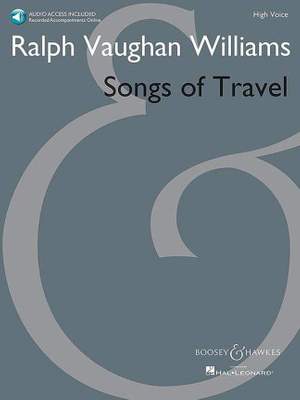
- View full details
Vaughan Williams, R: Songs of Travel
- Composer: Vaughan Williams
- Arrangement: high voice and piano (HGH VCE/PF)
- Edition Information: Edition with Online audio file: new edition with online audio of piano accompaniments
- Publisher: Boosey & Hawkes
- Catalogue Number: BHI93449
- Language: English
Sheet Music
Usually despatched in 5 - 7 working days
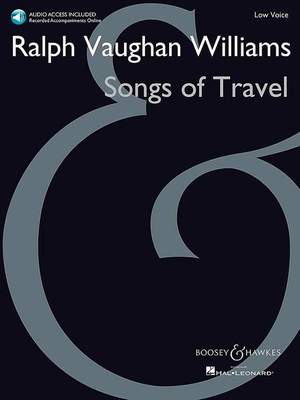
- Arrangement: low voice and piano (LOW VCE/PF)
- Catalogue Number: BHI93450
- Date Published: 1st Sep 2016
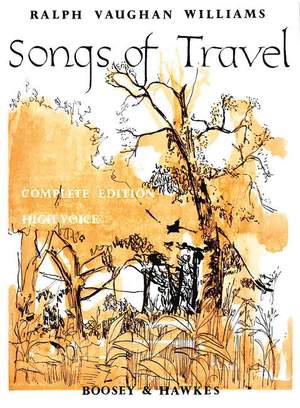
Complete Edition
- Catalogue Number: BH-2861
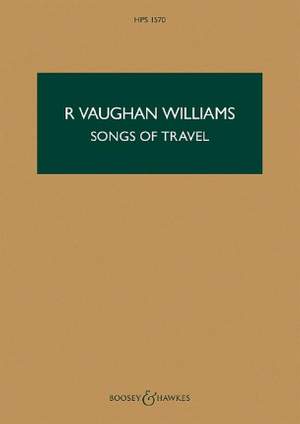
Vaughan Williams, R: Songs of Travel HPS 1570
- Arrangement: voice and orchestra (VCE/ORCH)
- Edition Type: Study/Miniature Score
- Catalogue Number: BH13306
- Date Published: 19th Sep 2018
- Series: Hawkes Pocket Scores
Download queue
- Clear completed

- Liberty University
- Jerry Falwell Library
- Special Collections
- < Previous
Home > ETD > Masters > 901
Masters Theses
Songs of travel: an analytical study of ralph williams’ compositional styles.
Jonathan Jacobs Lawton , Liberty University Follow
School of Music
Master of Arts in Music Education (MA)
Mark Greenawalt
English Musical Renaissance, Song Cycle, Text Painting
Disciplines
Music | Music Education
Recommended Citation
Lawton, Jonathan Jacobs, "Songs of Travel: An Analytical Study of Ralph Williams’ Compositional Styles" (2022). Masters Theses . 901. https://digitalcommons.liberty.edu/masters/901
Ralph Vaughan Williams is perhaps one of the most prolific and diverse composers from the British Isles to grace the world with his compositions. He was born in the middle of the English Musical Renaissance, a time of musical rejuvenation of the British Art Song that embraced the principles of the Romantic period and placed significance on the importance of national identity. Ralph Vaughan Williams was the embodiment of musical citizenship – a musical philosophy that leans heavily on national identity for inspiration of word and song. In 1901, a young Ralph Vaughan Williams began writing music for Songs of Travel. Songs of Travel and Other Verses was written as a series of poems by Robert Louis Stevenson, a famous author known for writing well-known works such as Treasure Island and The Strange Case of Dr. Jekyll and Mr. Hyde. During World War I, Ralph Vaughan Williams served his country in the war effort. After his time traveling across Europe as a musician for the British Army, his post-war composition style and focus changed greatly. This change in style stunned his contemporaries because the music he created was vastly different. How did the structure and style of his compositions change after serving in World War I? What other influences contributed to these changes? Through comparison of post-war works with Songs of Travel, what aspects of harmony, melody, and instrumentation demonstrate these developments?
Since August 18, 2022
Included in
Music Education Commons
- Collections
- Faculty Expert Gallery
- Theses and Dissertations
- Conferences and Events
- Open Educational Resources (OER)
- Explore Disciplines
Advanced Search
- Notify me via email or RSS .
Faculty Authors
- Expert Gallery Login
Student Authors
- Undergraduate Submissions
- Graduate Submissions
- Honors Submissions
Home | About | FAQ | My Account | Accessibility Statement
Privacy Copyright

- Permanent link
- Add Manuscript
- New Composition
- New Arrangement
- New Edition
- navbarexpfileent
- Search by IMSLP index
- Random page
- WIMA collection
- Commercial recordings
- Disclaimers
Songs of Travel (Vaughan Williams, Ralph)
Performances.
- Recordings ( 1 )
- Commercial 💿 ( 0 )
- Accompaniments ( 0 )
- Synthesized/MIDI ( 0 )
Selections * #93995 - 8.07MB - 8:49 - 0.0/10 2 4 6 8 10 ( - ) - ! N / ! N / 29 - 4821 × ⇩ - MP3 - Carolus
MP3 file (audio) Carolus (2011/2/24)
Sheet Music
- Scores ( 11 )
- Parts ( 0 )
- Arrangements and Transcriptions ( 0 )
- Libretti ( 0 )
- Other ( 0 )
- Source Files ( 0 )
Complete (original version without epilogue)
Complete Score * #96383 - 2.49MB, 37 pp. - 0.0/10 2 4 6 8 10 ( - ) - V / V / 29 - 35011 × ⇩ - Dbmiller
PDF scanned by Unknown Dbmiller ( 2011/3/17 )
Complete Score (transposed for High Voice) * #89688 - 4.74MB, 5 pp. - 0.0/10 2 4 6 8 10 ( - ) - V / V / 29 - 14066 × ⇩ - TJ Busse
PDF scanned by Unknown TJ Busse ( 2011/1/8 )
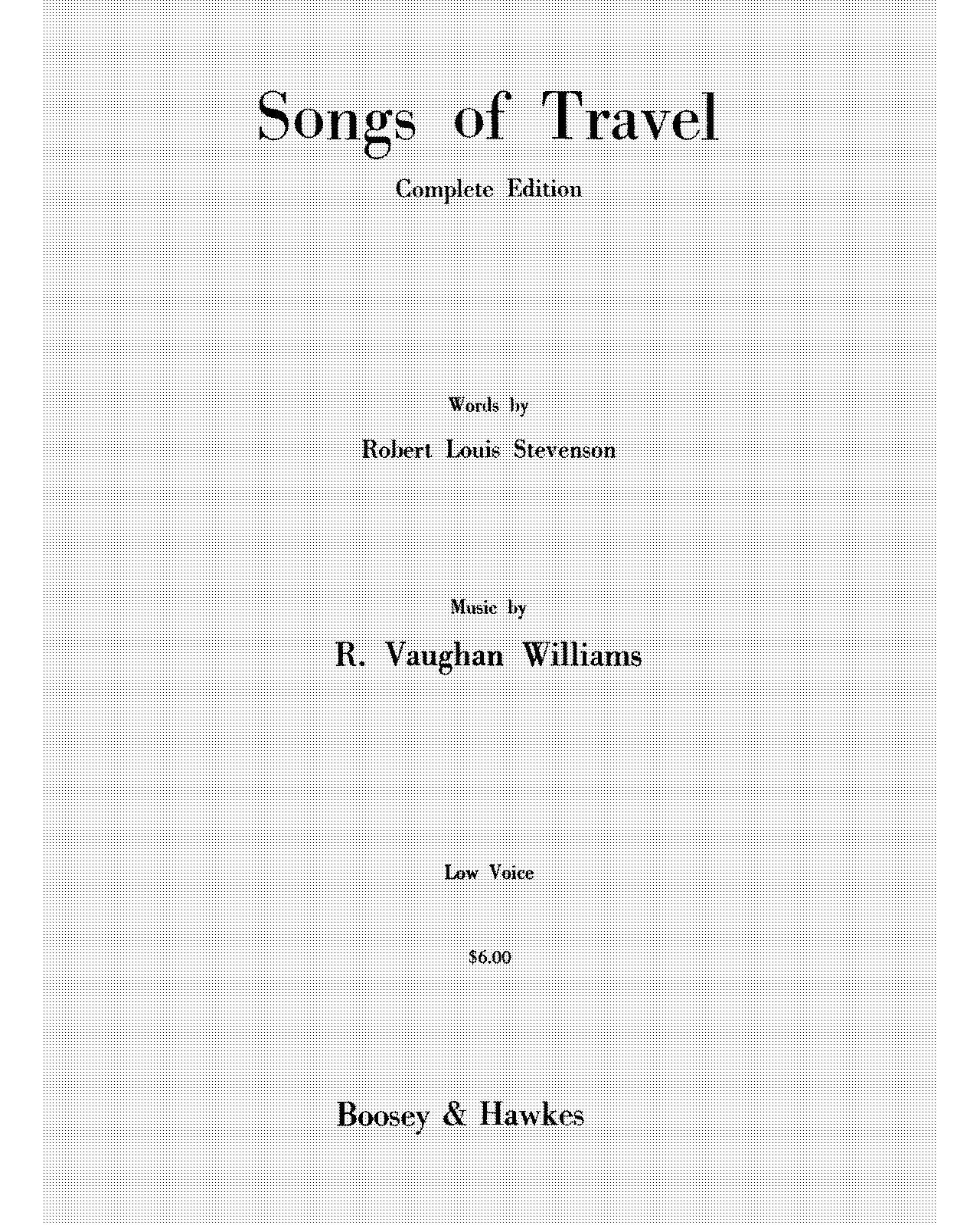
Complete (with posthumous epilogue)
Complete Score (CA) * #834156 - 2.62MB, 39 pp. - 0.0/10 2 4 6 8 10 ( - ) - V / 56 / 29 - Dbmiller
PDF scanned by Unknown Dbmiller ( 2023/1/14 )
Four Songs (Nos.2, 4, 5, 6) * #873636 - 1.87MB, 25 pp. - 0.0/10 2 4 6 8 10 ( - ) - V / V / 29 - 22 × ⇩ - Cypressdome
PDF scanned by Hathitrust Cypressdome (2023/9/6)
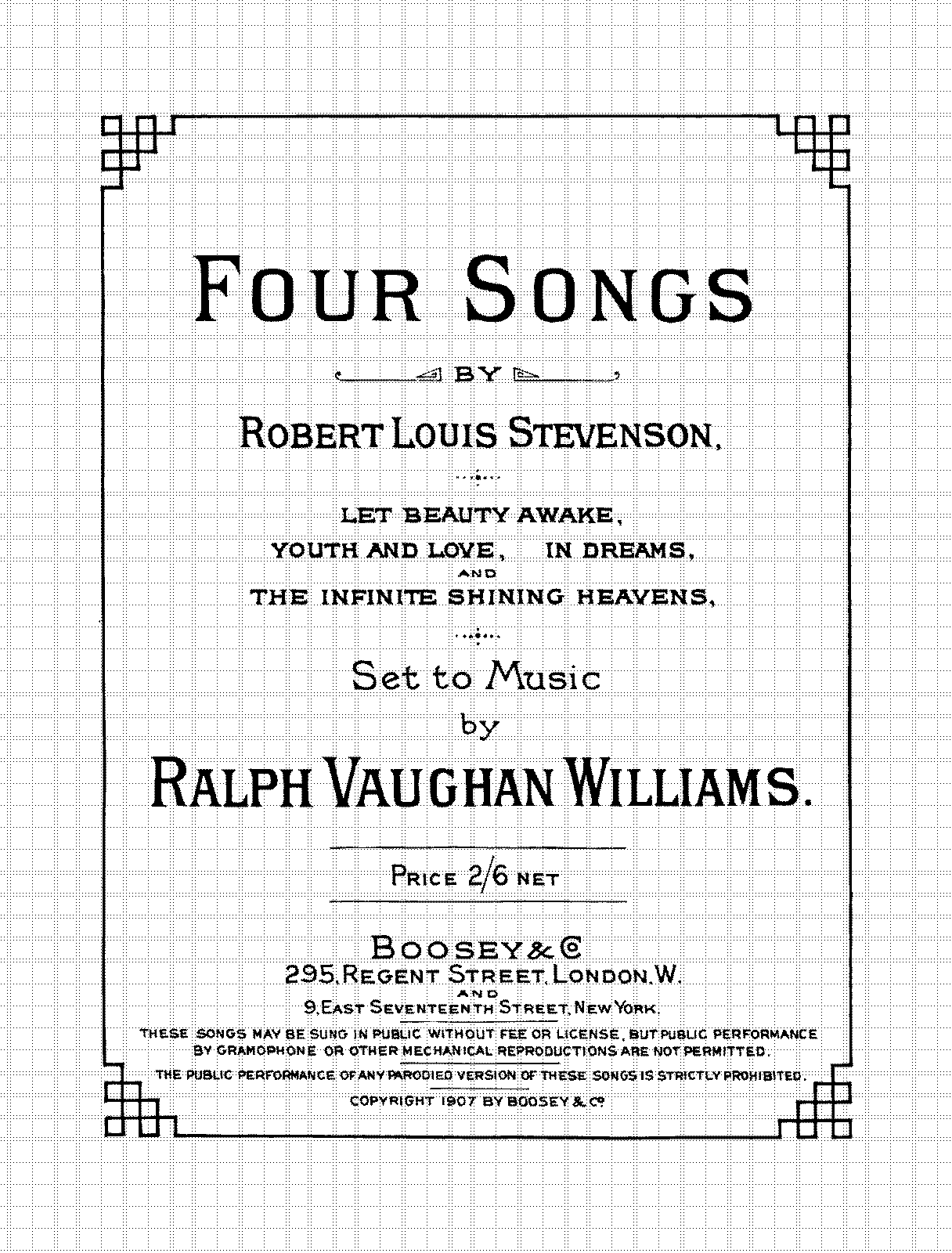
1. The Vagabond * #286189 - 0.10MB, 5 pp. - 0.0/10 2 4 6 8 10 ( - ) - ! N / ! N / 29 - 22791 × ⇩ - PhilHolmes
PDF typeset by editor PhilHolmes ( 2013/6/27 )
2. Let Beauty Awake * #287221 - 0.09MB, 4 pp. - 0.0/10 2 4 6 8 10 ( - ) - ! N / ! N / 29 - 9344 × ⇩ - PhilHolmes
PDF typeset by editor PhilHolmes (2013/7/7)
3. The Roadside Fire * #288044 - 0.11MB, 5 pp. - 0.0/10 2 4 6 8 10 ( - ) - ! N / ! N / 29 - 7855 × ⇩ - PhilHolmes
PDF typeset by editor PhilHolmes (2013/7/13)
4. Youth and Love * #288443 - 0.11MB, 4 pp. - 0.0/10 2 4 6 8 10 ( - ) - ! N / ! N / 29 - 6634 × ⇩ - PhilHolmes
PDF typeset by editor PhilHolmes (2013/7/16)
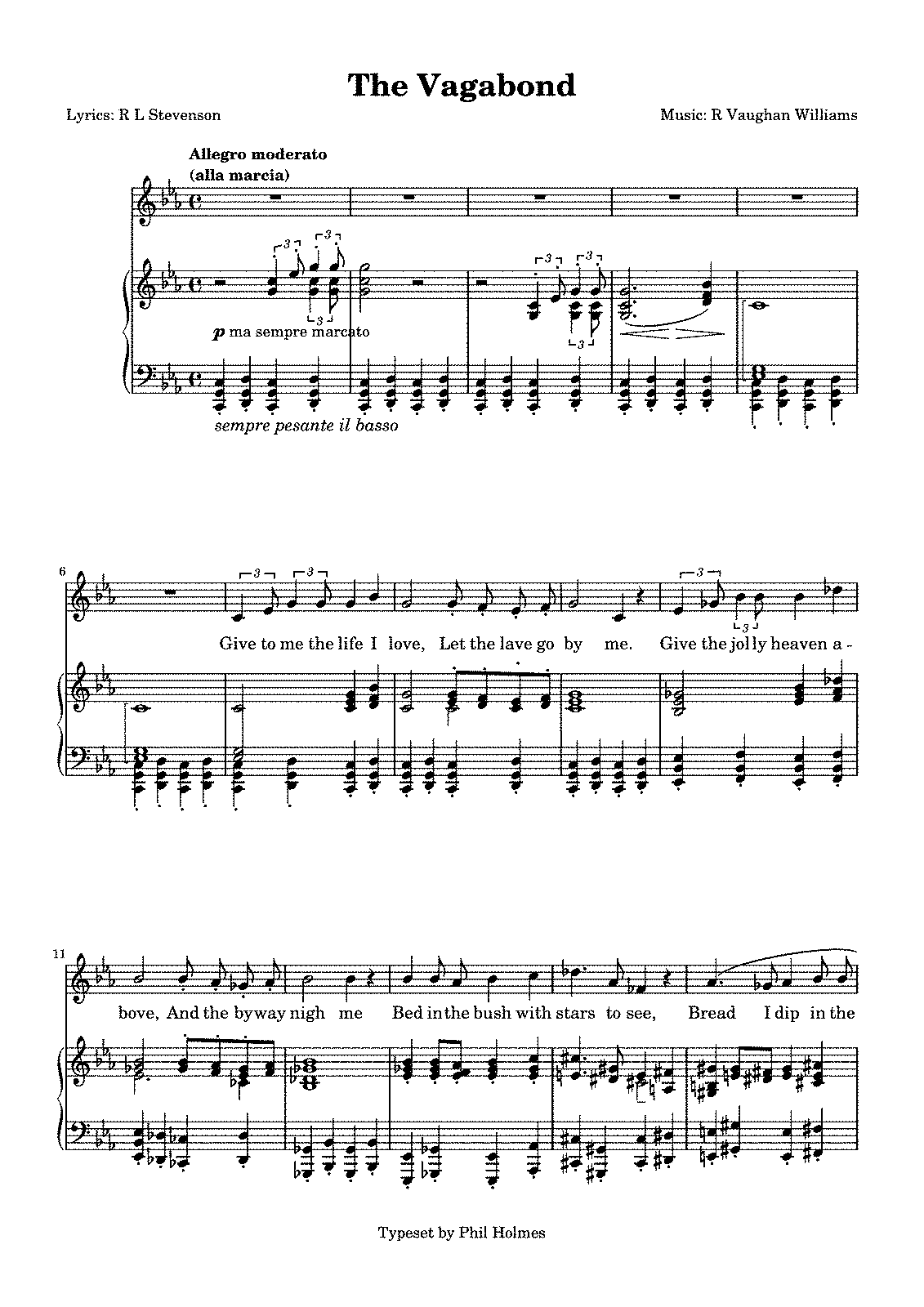
7. Wither Must I Wander (C minor) * #89691 - 0.36MB, 4 pp. - 0.0/10 2 4 6 8 10 ( - ) - V / V / 29 - 3737 × ⇩ - TJ Busse
PDF scanned by TJ Busse TJ Busse ( 2011/1/8 )
7. Whither Must I Wander (C minor) * #439292 - 0.52MB, 9 pp. - 0.0/10 2 4 6 8 10 ( - ) - V / V / 29 - 229 × ⇩ - Zeyarshwe
PDF scanned by Unknown Zeyarshwe (2016/9/15)
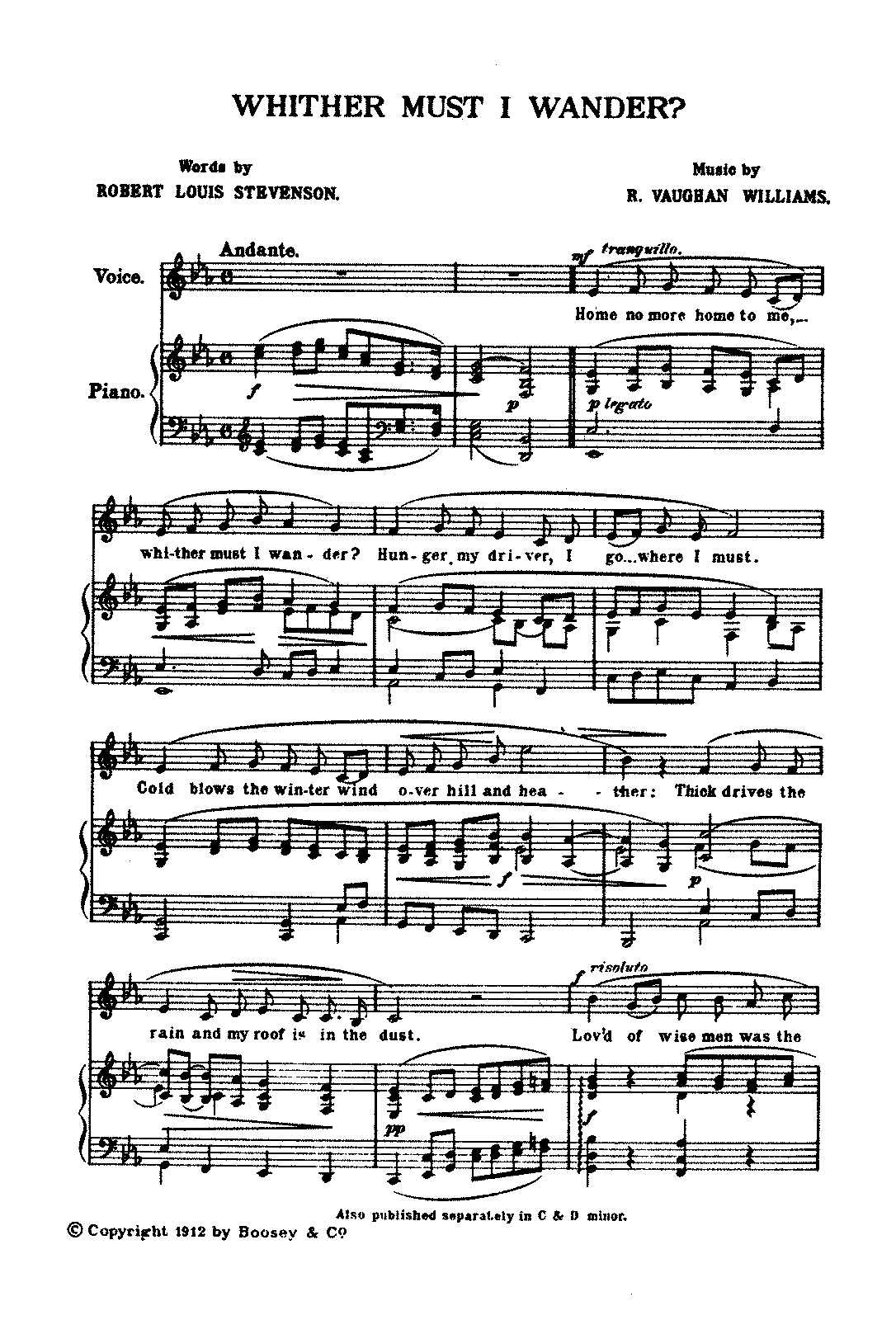
9. I Have Trod the Upward and the Downward Slope (CA) * #538269 - 1.52MB, 2 pp. - 0.0/10 2 4 6 8 10 ( - ) - V / 55 / 29 - Dbmiller
PDF scanned by Dbmiller Dbmiller (2018/8/27)
General Information
- WorkNonPD-EU
- Belov, Anton/Performer
- Brown, Lydia/Performer
- Gardner Museum Recordings
- Pages with First Editions
- Scores published by Boosey & Hawkes
- Scores from HathiTrust
- Vaughan Williams, Ralph
- Early 20th century style
- Early 20th century
- For voice, piano
- For voices with keyboard
- Scores featuring the voice
- Scores featuring the piano
- English language
- Works first published in 1905
- Works first published in the 20th century
- Pages with commercial recordings
- Pages with commercial recordings (Naxos collection)
- Stevenson, Robert Louis/Librettist
- Share full article
Advertisement
Supported by
Andrew Davis, 80, Dies; Renowned Conductor Who Championed Britain’s Music
Celebrated for his long tenure with Lyric Opera of Chicago, he led this and other orchestras with force and a notably energetic podium presence.

By Adam Nossiter
Andrew Davis, an ebullient British conductor who brought energy to his countrymen’s compositions and passion to hundreds of opera performances, died on April 20 in Chicago. He was 80.
His manager, Jonathan Brill, said the cause of Mr. Davis’s death, in a hospital, was leukemia.
More than many conductors, Mr. Davis was remembered by those who worked with him as deriving a sense of physical enjoyment from the music — “almost a palpable pleasure,” the pianist Emanuel Ax said in an interview. And that translated into a pleasure for his collaborators. “People loved playing for him,” Mr. Ax said.
Mr. Davis spent 21 years, from 2000 to 2021, as music director and principal conductor of one of America’s great opera companies, Lyric Opera of Chicago , in a vast repertoire ranging from Mozart through Wagner to Berg. He also led orchestras in Canada — the Toronto Symphony Orchestra, from 1975 to 1988 — and Australia — the Melbourne Symphony Orchestra, from 2013 to 2019. He also conducted at the Glyndebourne Festival in England from 1988 to 2000.
But it was as an interpreter of 20th-century British music, and particularly the works of Elgar, Vaughan Williams, Delius, Holst, Britten and others, that Mr. Davis made his mark and earned his way into the affections of his fellow Britons. With its fervid, billowing patriotism and ruminative pastoral interludes, this music sometimes struggles to cross national boundaries.
Mr. Davis, as principal conductor of the BBC Symphony Orchestra from 1989 to 2000 and at summer London Proms concerts in front of enthusiastic audiences of thousands in the Royal Albert Hall, made the most of the British compositions that were his specialty. This deep homegrown commitment led The New York Times’s Bernard Holland, reviewing a 1987 Avery Fisher Hall appearance by Mr. Davis that included little-known works by Arnold Bax and Michael Tippett, to write that “the music of 20th-century Britain has hugely profited from the fervent ministrations of British musicians and the British musical press.”
Mr. Holland’s lack of enthusiasm about Mr. Davis’s musical choices underscored the difficulty of exporting such quintessentially national music. British critics though, have always been effusive about his championing of their music. “A proven Elgarian whose wonderfully perceptive conducting has authoritative sweep, elasticity and fiery passion to spare,” Andrew Achenbach of Gramophone magazine wrote about his recording of the Elgar violin concerto.
Mr. Davis combined a modest, self-deprecating personal style with a notably energetic podium presence. He “practically vaulted to the podium and seemed utterly delighted to be there,” Steve Smith wrote in The Times in 2010 of a performance of French works.
Complex 20th-century scores like Stravinsky’s 1946 Symphony in Three Movements held no terrors for him. A 2022 recording with the BBC Philharmonic demonstrates his mastery of the work’s turbulent polyphony. When he was a student at Cambridge, he was casually asked if he wanted to conduct Schoenberg’s fearsome Five Pieces for Orchestra; he blithely accepted, and it was only “years later you realize how fiendishly difficult it is,” he remembered, laughing at himself, in an interview with Peter Sagal of NPR two years ago.
“Whenever he comes to conduct, you can just see his love of the music, He’s so excited. It just sort of pours out of his body,” Abbey Edlin, a French horn player in the Melbourne orchestra, said in a video tribute .
The British opera critic Alan Blyth, writing in The Grove Dictionary of Music and Musicians, described Mr. Davis as a “conductor whose technical skill was enhanced by an inborn enthusiasm for and dedication to the task in hand that he was able to transfer to the forces before him.” in the Grove Dictionary of Music and Musicians.
Yet his early-career move into conducting — he was a prestigious Organ Scholar at King’s College, Cambridge — was, in his understated telling, almost an afterthought. “I got interested in conducting sort of by accident,” he told Mr. Sagal. He had been invited to conduct a Haydn divertimento, he recalled, and “I thought, well, I rather like this.”
“I liked being able to bring a group together,” he explained. “I suppose the basis of my conducting technique, such as it is, started early.”
His instinctual approach to conducting served him well in opera. At the Lyric Opera of Chicago, he led almost 700 performances of 62 operas, by 22 composers. There were also many performances at La Scala in Milan, the Metropolitan Opera in New York, the Royal Opera House in Covent Garden, the Bayreuth Festival and elsewhere.
“He was less concerned with detail than a lot of people,” Mr. Ax said. “He was more concerned with the general outline of things. He would think about vigor as opposed to lassitude.” He added: “I think he was about the big picture. That’s why he was terrific in opera.”
Andrew Frank Davis was born on Feb. 2, 1944, in Ashridge, in the county of Hertfordshire, the son of Robert Davis, a typesetter, and Florence Joyce (Badminton) Davis.
He began learning piano at the age of 5 and attended Watford Grammar School for Boys; he sang in the school choir and also played organ for the parish choir. In a reminiscence for the Royal Scottish National Orchestra, Mr. Davis recalled , in awe-struck tones, seeing the aged Vaughan Williams in a London recording studio when he was a 12-year-old chorister. He studied piano at the Royal Academy of Music in London, graduated from the University of Cambridge in 1967, and from 1966 to 1970 was pianist, harpsichordist and organist with the Academy of St. Martin in the Fields.
Mr. Davis studied conducting in Rome, at the Accademia Nazionale di Santa Cecilia, and made his conducting debut in 1970 with the BBC Symphony Orchestra. His international career took off swiftly after that. He acquired a long list of awards for his recordings, notably with the BBC Symphony Orchestra.
Mr. Davis was knighted in Britain’s 1999 New Year Honors list.
In 1989 he married the American soprano Gianna Rolandi , whom he had conducted in Richard Strauss’s “Ariadne auf Naxos” at the Metropolitan Opera in 1984. She died in 2021.
He is survived by his son, the composer Edward Frazier Davis; a sister, Jill Atkins; and his brothers, Martin and Tim Davis.
“I felt so engaged, engaged with him,” Mr. Ax recalled. “He was with you every step of the way. It was very much a collaborative thing. We were all engaged in the same thing. That’s the mark of a great conductor.”
Adam Nossiter has been bureau chief in Kabul, Paris, West Africa and New Orleans, and is now a Domestic Correspondent on the Obituaries desk. More about Adam Nossiter
- International edition
- Australia edition
- Europe edition
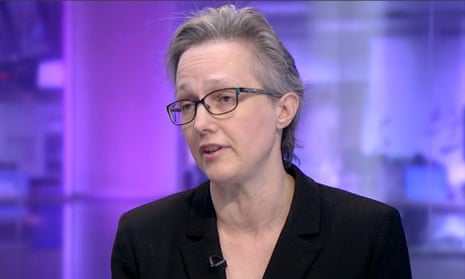
Jenny Vaughan obituary
Neurologist and campaigner for reform of the law on gross negligence manslaughter
Jenny Vaughan, who has died aged 55 of cancer, was a consultant neurologist best known for her courageous campaigning to reform the law on gross negligence manslaughter, and end the blame game in healthcare.
She fearlessly championed two doctors convicted of gross negligence manslaughter: the surgeon David Sellu and paediatrician Hadiza Bawa-Garba . On the back of these cases, she set up with others the Doctors’ Association UK and led its “Learn Not Blame” campaign to achieve a “just culture” in healthcare, which helped to reduce significantly the number of investigations into this crime.
In 2013, Vaughan was astonished that Sellu, her colleague at Ealing hospital, in west London, was in Belmarsh prison, convicted of gross negligence manslaughter. The colorectal surgeon also worked at the private Clementine Churchill hospital in Harrow, north-west London, and in 2010 had been asked to review a patient there with abdominal pain. A scan showed the patient had a perforated bowel, an emergency condition, but Sellu was unable to operate straight away as the hospital did not have available a suitable anaesthetist or operating theatre. He operated later, but the patient, who had liver cirrhosis as well, died two days later in intensive care. Sellu was tried at the Old Bailey in 2013 and sentenced to two-and-a-half years in prison.

Vaughan contacted Sellu’s wife, who also worked at Ealing hospital. They created a website, Friends of David Sellu, and started raising money, combing evidence and drumming up support.
Lawyers advised Vaughan the chances of getting an appeal off the ground were minuscule. But she pressed on, digging up fresh evidence that had not been presented at Sellu’s trial, and when Sellu was released from prison in February 2015, he was thereby granted leave to appeal.
In November 2016 his conviction was quashed by three appeal court judges – not because of the new evidence, but on the grounds that the original judge had not properly directed the jury. What are the criteria for gross negligence manslaughter as related to healthcare? It seemed at Sellu’s original trial, no one knew – not the police, the coroner or even the judge.
Sellu said: “Jenny was a great warrior. She overturned my case against all the odds.”
Vaughan continued to speak out widely, articulating the unease many felt. Could any healthcare worker be incarcerated for their hospital’s inadequacies or for making a simple mistake? Vaughan said healthcare workers should not be above the law, but the law needed clarifying. She persuaded people that there is no societal benefit to rush to criminalise doctors and the bar should be higher: someone accused of this crime should have exhibited reckless behaviour, equivalent, for example, to deliberately driving down the wrong side of the road.
Vaughan also supported Bawa-Garba , who in 2015 was found guilty of the manslaughter of a child, Jack Adcock, through gross negligence and was given a two-year suspended sentence. The General Medical Council took legal action to get Bawa-Garba permanently struck off the medical register, but in the end the court of appeal found in her favour in 2018 and she was allowed back to work the following year. As the case unfolded, reports emerged of concerns at Leicester Royal Infirmary, where Bawa-Garba worked, at the time of Jack’s death in 2011. These included lack of training, understaffing, huge workloads, rota gaps, IT failures and more. Many junior doctors in the UK worked in the same conditions and worried that they could be next.
Following Bawa-Garba’s conviction, Vaughan had discussions with the then health secretary, Jeremy Hunt, and in 2018 he ordered a rapid policy review conducted by Prof Sir Norman Williams . It made many recommendations including a threshold for what constitutes “exceptionally bad performance”, which the Crown Prosecution Service and others must adhere to. Since then, the number of investigations into this crime has fallen to single figures.
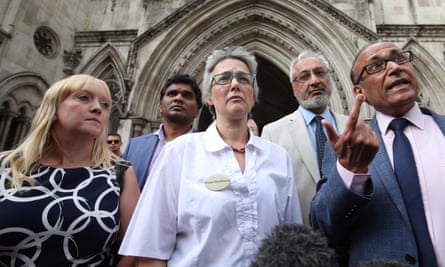
Born in Bristol, Jenny was the middle child of Elizabeth (nee Bessant), a nurse who later taught history, and Leslie Vaughan, a teacher. She attended Redmaids school, a highlight of which time was a school trip to Moscow in 1982. Two years later she travelled solo by train through iron curtain countries to visit her penpal in Hungary.
Vaughan then studied medicine at Nottingham University. Graduating in 1992, she spent time working in Madagascar before moving to London. In 1996-99 she studied for a PhD in the neurogenetics of Parkinson’s disease at University College London and became a consultant neurologist at Ealing in 2003.
Vaughan combined working full-time with activism: from 1998 to 2006 she was a Labour councillor in Fulham. She had a strong Christian faith and was impelled to protest against injustice wherever she saw it. In 2005 she and a fellow neurologist, David Nicholl, graphically enacted force-feeding outside the American Embassy in London in protest at the practice being used to keep detainees alive in Guantánamo Bay. Vaughan damned it as “medicalised torture”.
She successfully spearheaded opposition to the closure of the accident and emergency department at Ealing in 2013, and in 2018 came the co-founding of the Doctors’ Association UK. In the Covid-19 crisis, she created an app for frontline doctors to report shortages of PPE.
The same year Vaughan received the BMJ editor’s award for “speaking truth to power” and in 2019 Bapio (British Association of Physicians of Indian Origin) gave her an award in acknowledgement of her support of BAME doctors.
At university she had met Matt Dunckley, who later became a surgeon. The pair married in 1993 and had two sons, Jonathan and Christopher. At home they had several pet tortoises, as Vaughan had a lifelong love of these reptiles. A holiday to the Galápagos Islands to see giant tortoises was a particular highlight for her.
In 2017, she was diagnosed with breast cancer and in 2020 she had to retire from the NHS on health grounds. She kept campaigning, however, and was appointed OBE in 2023.
She is survived by her husband and two sons, and by her mother and her sister, Lise, and brother, Andrew.
Comments (…)
Most viewed.

IMAGES
VIDEO
COMMENTS
Songs of Travel is a song cycle of nine songs originally written for baritone voice composed by Ralph Vaughan Williams, with poems drawn from the Robert Louis Stevenson collection Songs of Travel and Other Verses.A complete performance of the entire cycle lasts between 20 and 24 minutes. They were originally written for voice and piano. Vaughan Williams orchestrated the first, third, and ...
Extra Information. *No.9. "I have Trod the Upward and the Downward Slope" published posthumously in 1960 and should be sung only if the entire cycle is being performed. Vaughan Williams orchestrated the first, third, and eighth songs, and his assistant Roy Douglas later orchestrated the remaining songs using the same instrumentation.
Vaughan Williams - Songs of Travel00:00 1. The Vagabond 03:12 2. Let Beauty Awake05:15 3. The Roadside Fire07:40 4. Youth and Love11:16 5. In Dreams13:50 6. ...
Language: English. Give to me the life I love, Let the lave go by me, Give the jolly heaven above And the byway nigh me. Bed in the bush with stars to see, Bread I dip in the river - There's the life for a man like me, There's the life for ever. Let the blow fall soon or late, Let what will be o'er me; Give the face of earth around And the road ...
Songs of Travel Ralph Vaughan Williams. Released December 2, 1904. Songs of Travel Tracklist. 1. The Vagabond Lyrics. 15.9K 2. Let Beauty Awake Lyrics. 3. The roadside fire ...
Provided to YouTube by Universal Music GroupVaughan Williams: Songs of Travel - I. The Vagabond · Bryn Terfel · Malcolm MartineauBryn Terfel - The Vagabond℗ ...
Ralph Vaughan Williams: Songs of Travel for Voice and Piano ( 1901, 1904) I. VagabondRecorded live in Alice Tully Hall on October 30, 2016.Video produced by ...
26. Ashley Riches, Anna Tilbrook: Vaughan Williams: Perspectives 2 19 Oct 2022; 104. Christopher Maltman: Songs of Travel 23 Oct 2021; 08. Songs of Travel: James Platt & Lada Valešová 28 Feb 2021; Songs of Travel: Benjamin Appl & Simon Lepper 02 Apr 2020; Songs of Travel: Nicholas Mogg & Jâms Coleman 19 Oct 2018; James Gilchrist & Anna ...
The accompanying booklet gives the words of the songs, but with Standen, they are never needed. The first section has some of the best of Songs of Travel - The Vagabond, dauntless and sturdy, Bright is the Ring of Words, a joyous celebration of the transformative power of Art, while The Roadside Fire is sunny and exuberant.Standen delivers the melancholy spirit of Whither Must I Wander so ...
To begin with two observations: (1) of the nine songs that eventually came to comprise Vaughan Williams's Songs of Travel, two - Nos 4 ('Youth and Love') and 9 ('I Have Trod the Upward and the Downward Slope') - quote material from earlier songs; and (2) in an article published in 1897, Vaughan Williams criticized some of his predecessors for lacking a 'nice sense of proportion ...
A new music service with official albums, singles, videos, remixes, live performances and more for Android, iOS and desktop. ... Vaughan Williams Songs of Travel. Playlist • Jason Pano • 2020. 160K views • 9 tracks • 24 minutes More. Shuffle. ... Songs of Travel - I have Trod the Upward and the Downward Slope. Jason Pano. 2:14. New ...
Ralph Vaughan Williams' The Vagabond was originally set for voice and piano and is part of a larger song cycle entitled Songs of Travel. Composed between 1901-1904, this was Vaughan Williams' first major offering in the world of vocal music. Songs of Travel is a nine part song cycle
Songs of Travel was among British composer Ralph Vaughan Williams' first forays into writing songs, and it coincided with a very important time in his compositional career. The songs were composed between 1901 and 1904 when the young Vaughan Williams was beginning to emerge as a unique voice among the luminaries of English classical music.
Welcome to St. Thomas's! This is the fourteenth installment of our Evensong recital series, featuring artists from the St. Thomas's community - this week's p...
Offer Vaughan Williams & Holst: Heirs and Rebels. Remastered classic 78 rpm recordings. Robert Irwin (baritone), Stuart Robertson (tenor), Edgar Coyle (baritone), Peter Dawson (baritone) & Gerald Moore (piano) Black Dyke Mills Band, BBC Chorus & Band of HM Grenadier Guards, Rae Jenkins, Leslie Woodgate & Julius Harrison.
Vaughan Williams: Songs of Travel. Chandos: CHAN10969. Buy CD or download online. James Gilchrist (tenor), Philip Dukes (viola), Anna Tilbrook (piano)
Vaughan Williams, R: Songs of Travel. Composer: Vaughan Williams. Arrangement: low voice and piano (LOW VCE/PF) Edition Information: Edition with Online audio file: new edition with online audio of piano accompaniments. Publisher: Boosey & Hawkes. Catalogue Number: BHI93450. Language: English. Pages: 40. Date Published: 1st Sep 2016.
Digital Sheet Music. Choral Digital Downloads Classical & Contemporary Digital Downloads ... Vaughan Williams, Ralph. Songs of Travel (1901-04) orchestrated by the composer (Nos.1,3,8) and Roy Douglas (Nos.2,4,5,6,7,9) Duration: 23' Music Text. RL Stevenson (E) Scoring.
Apart from the Vaughan Williams Stevenson cycle, Hopkins concentrates on little-known settings - few on this side of the Atlantic will know the eight highly wrought songs to poems by Richard ...
Provided to YouTube by Universal Music GroupVaughan Williams: Songs of Travel - II. Let Beauty Awake · Bryn Terfel · Malcolm MartineauBryn Terfel - The Vagab...
In 1901, a young Ralph Vaughan Williams began writing music for Songs of Travel. Songs of Travel and Other Verses was written as a series of poems by Robert Louis Stevenson, a famous author known for writing well-known works such as Treasure Island and The Strange Case of Dr. Jekyll and Mr. Hyde. During World War I, Ralph Vaughan Williams ...
The Lied, Art Song, and Choral Texts Archive. Extra Information. *No.9. "I have Trod the Upward and the Downward Slope" published posthumously in 1960 and should be sung only if the entire cycle is being performed. Vaughan Williams orchestrated the first, third, and eighth songs, and his assistant Roy Douglas later orchestrated the remaining ...
But it was as an interpreter of 20th-century British music, and particularly the works of Elgar, Vaughan Williams, Delius, Holst, Britten and others, that Mr. Davis made his mark and earned his ...
From the album Vagabond: http://www.geoffreysirett.comGeoffrey Sirett, baritoneStephen Ralls, piano
Jenny Vaughan, who has died aged 55 of cancer, was a consultant neurologist best known for her courageous campaigning to reform the law on gross negligence manslaughter, and end the blame game in ...